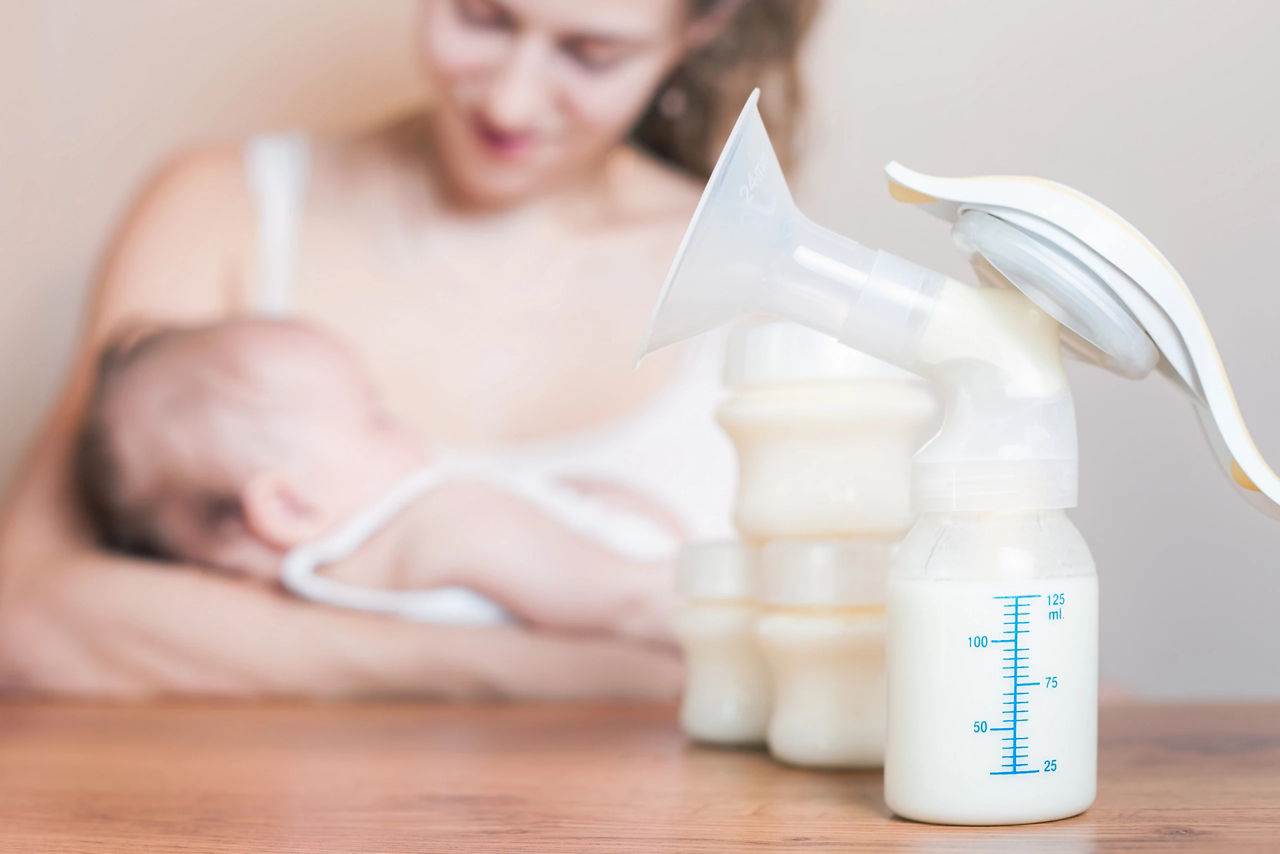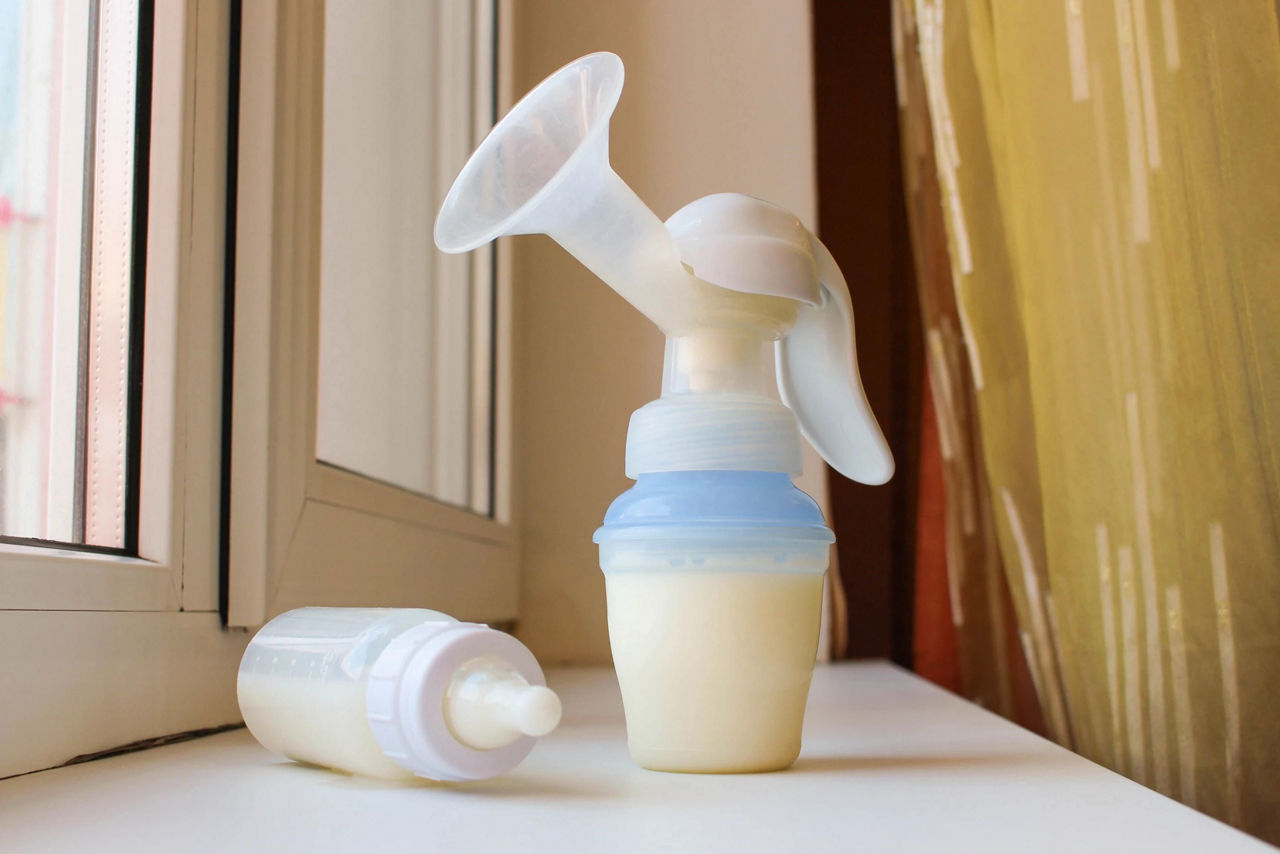Whether going back to work, or sharing the feeding with your partner expressing breast milk ensures your baby gets all the nutrition they need when you can’t be there to feed them. Whether you choose to do it by hand or using a manual or electric pump is up to you. Just bear in mind the importance of storing breast milk in the correct way.
Expressing and storing breast milk

Expressing breast milk ensures your baby gets all the nutrition they need when you can’t be there to feed them. Watch this short video from Aptaclub for a step-by-step guide on how to express and store your breast milk safely.
How to express breast milk
You may need to express milk if you’re away from your baby for any length of time, or if you’re returning to work but want to continue to feed breast milk. Whichever method you use, it’s important to make sure your hands are clean and that all bottles, containers and pump pieces are washed and sterilised. Before expressing, massage your breasts to encourage the milk to flow4.

How to express by hand⁵
Make a C shape with your thumb and index finger or middle finger and cup your breast. Press towards your rib cage and then, maintaining the pressure, push forwards easing the milk towards the nipple. Release the pressure and repeat. You’ll need to use a container with a wide opening to collect the milk. In order to express well you need to be relaxed and comfortable and you may find it helpful to think about your baby. To begin with you may only be able to express a few drops however the more often you express, the more milk you will produce.
How to express using a pump
How to express using a pump
Expressed breast milk must be stored in a sterilised container, and make sure you label them with the date of expressing and the volume of milk inside2.

How long does breast milk last?
Ensuring all breast milk has been expressed with clean hands and that all bottles, containers and pump pieces are washed and sterilised. Then these can act as a guide for storage times:
How long does breast milk last in the fridge²?
- Use within 3 days
- If your fridge is lower than 4oC, it can be stored for up to 5 days
How long does breast milk last in the freezer³?
- If your freezer is -18oC, it can be stored for up to 6 months
- Do not freeze defrosted breast milk
- Defrosted milk should be consumed within 2 hours
How long does breast milk last in at room temperature²?
- Use within 4 hours
How to warm expressed breast milk
Warm expressed breast milk by putting the bottle in warm water or holding it under the warm tap. You can give your expressed breast milk cold to your baby as well2. Do not reheat in the microwave as microwaving creates spots of heat in the milk and reduces the immune protection features which are contained in your milk.
How to defrost frozen breast milk
Letting your frozen breast milk defrost naturally in the fridge is the best way to defrost it. If you need the milk more quickly than this, then you can defrost in the same way you would warm breast milk by putting the bottle in warm water or holding it under the warm tap. Do not refreeze defrosted breast milk2. Microwaving creates spots of heat in the milk and reduces the immune protection features which are contained in your milk6.
When to express breast milk
Your breast milk changes with the time of day and different milk affects your baby’s sleep cycle. For example, your night time breastmilk contains things such as the sleep hormone melatonin. Therefore, when expressing breast milk, it should be considered when the milk was expressed whilst feeding. This is to make sure the infant is getting the correct milk at the right time of day1.

related articles
Learn more about breastfeeding

Need some help?
You can get quick answers to common questions in our FAQs.
Alternatively, if you need help with general pregnancy or baby advice, or maybe on using or ordering our products - our expert team are always on hand to talk about feeding your baby.
- White, R. Circadian variation of breast milk components and implications for care. Breastfeed Med, 2017;12(7):398-400.
- Eglash, A. and Simon, L. Breastfeed Med, 2017;12(2):390-395.
- nhs.uk. (2019). Expressing and storing breast milk. [online] Available at: https://www.nhs.uk/conditions/pregnancy-and-baby/expressing-storing-breast-milk/ [Accessed 19 Dec. 2019].
- Bowles, B. Clinical Lactation, 2011;2(4):21-24.
- Green, D., et al. Early Hum. Dev., 1982;6(2):153-159.
- Orlando, S. J Obstet Gynecol Neonatal Nurs, 1995;24(7):678-683.
Last reviewed: 18th August 2020
Reviewed by Nutricia’s Medical and Scientific Affairs Team



